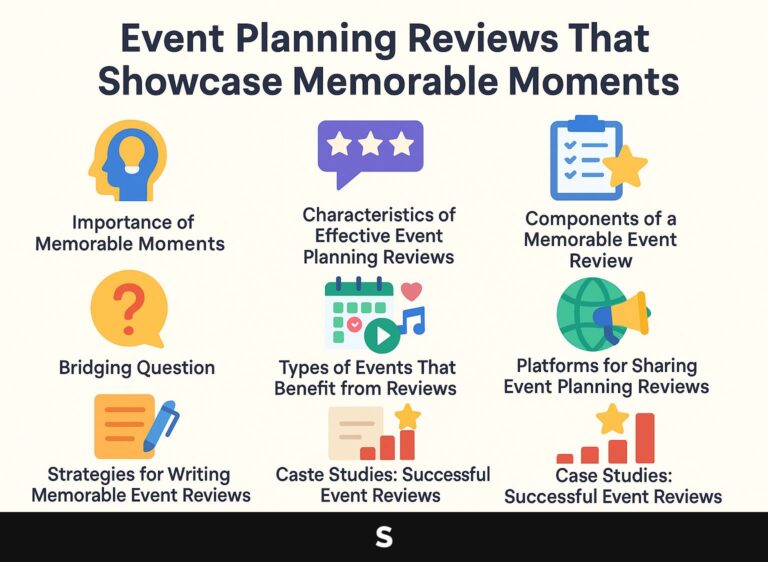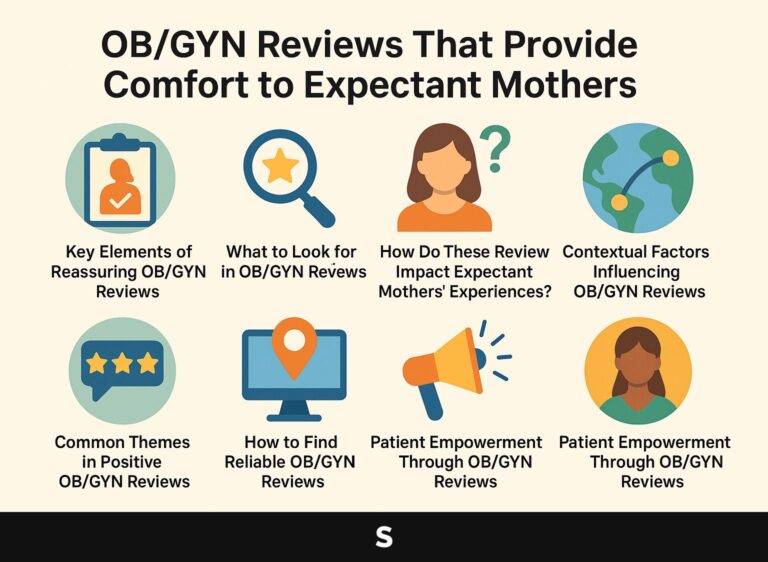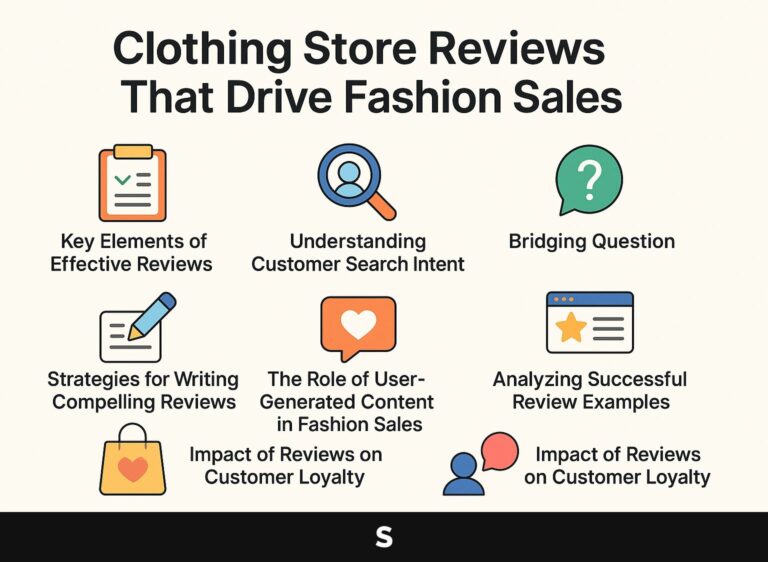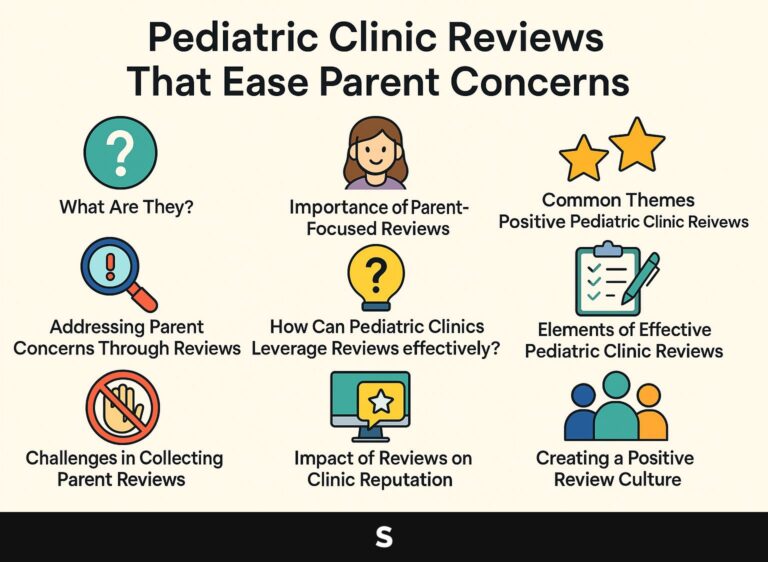How Hotels Can Get More TripAdvisor Reviews at Check-Out
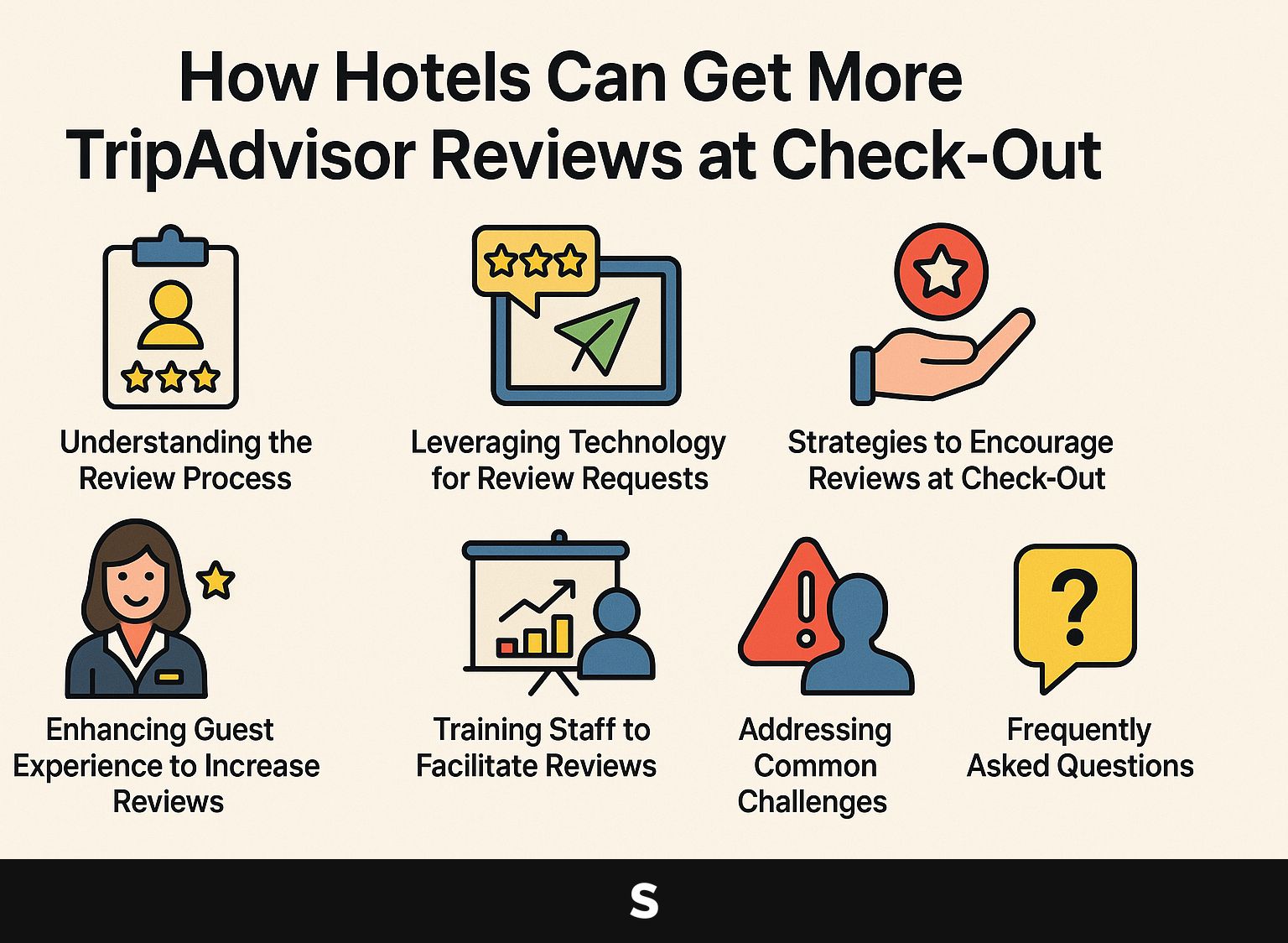
In the competitive field of hospitality, positive TripAdvisor reviews greatly influence a hotel’s online reputation. As guests check out, they often overlook the opportunity to share their experiences. With Spokk.io, hotels can easily add review requests during checkout, prompting guests to turn short comments into thorough feedback that recognizes staff quality and special features. This article will discuss ways to gather guest feedback effectively, which will help you improve your presence on TripAdvisor, Google, and Booking.com.
Key Takeaways:
- How Hotels Can Get More TripAdvisor Reviews at Check-Out
- Understanding the Review Process
- Using Technology for Review Requests
- Strategies to Encourage Reviews at Check-Out
- Enhancing Guest Experience to Increase Reviews
- Training Staff to Facilitate Reviews
- Measuring the Impact of Review Requests
- Addressing Common Challenges
- Frequently Asked Questions
- How can hotels encourage guests to leave TripAdvisor reviews at check-out?
- Why is it important for hotels to get more TripAdvisor reviews at check-out?
- Can guests leave TripAdvisor reviews at check-out without a lot of effort?
- What should hotels do with the TripAdvisor reviews collected at check-out?
- How can hotels make sure guests leave positive reviews at check-out?
- Are there any benefits for hotels to have a high number of TripAdvisor reviews?
How Hotels Can Get More TripAdvisor Reviews at Check-Out
TripAdvisor reviews are important for hotels because they affect people’s decisions to book. Detailed reviews build trust and can lead to more reservations.
What are TripAdvisor reviews and why are they important for hotels?
TripAdvisor reviews provide a platform for guests to share their experiences, impacting a hotel’s online reputation and influence in travel decisions.
According to recent statistics, approximately 95% of travelers read reviews before booking accommodations.
Hotels with a star rating of 4.5 or higher convert 87% of potential visitors into bookings, illustrating the direct correlation between positive reviews and increased occupancy rates.
To improve your profile on TripAdvisor, ask visitors to share their thoughts, reply quickly to all reviews, and frequently add new, clear photos.
These actions help create trust with your audience and improve your search ranking on the platform.
Related insight: Mastering Customer Experience In Hospitality – Spokk
What is the role of guest feedback in the hospitality industry?
In the hospitality industry, guest feedback is important for improving services and learning about customer experiences.
Hotels like the Ritz-Carlton actively analyze guest reviews through software tools like Revinate and TrustYou. By sorting comments into groups like cleanliness, service speed, and amenities, they can focus on improvements.
For example, if feedback shows guests are unhappy with how long room service takes, hotels might make the ordering process faster or hire more staff during busy times.
Doing follow-up surveys after stays helps us make quick changes, proving that we pay attention and care about our guests’ experiences, which improves their loyalty and satisfaction. Understanding the nuances of customer experience vs customer satisfaction is essential in tailoring services that truly meet guest expectations.
Understanding the Review Process
Knowing how guests write reviews on TripAdvisor is important for hotels to improve their review collection methods.
How do guests typically leave reviews on TripAdvisor?
After their stay, people often write reviews on TripAdvisor. They usually use their phones or respond to email questions to share their thoughts and ratings.
To encourage reviews, hotels can implement specific strategies. Start by sending a follow-up email within 24 hours post-check-out, thanking guests for their stay and kindly reminding them to leave feedback.
Use platforms like Reviews.io and Trustpilot that can connect with your website to make the process easier. Giving rewards, like a discount on later reservations or a chance to win a prize, can encourage guests to talk about their experiences.
Make sure your Google My Business profile is up to date, as this increases visibility for potential reviewers.
What factors influence a guest’s decision to leave a review?
Factors such as memorable experiences, service quality, and the ease of submitting reviews significantly influence a guest’s likelihood of posting feedback.
To encourage reviews, focus on creating outstanding experiences. For example, provide custom services, such as recalling a guest’s preferred drink or meal, encouraging them to tell others.
Make the review process easier with tools like ReviewTrackers or Trustpilot, which make submissions simple. Consider sending a friendly email asking for feedback after their stay-this can increase response rates by over 10%.
Giving discounts for return visits can encourage guests to provide their feedback.
Using Technology for Review Requests
Tools like Spokk.io make it easier to involve guests in the review request process during check-out.
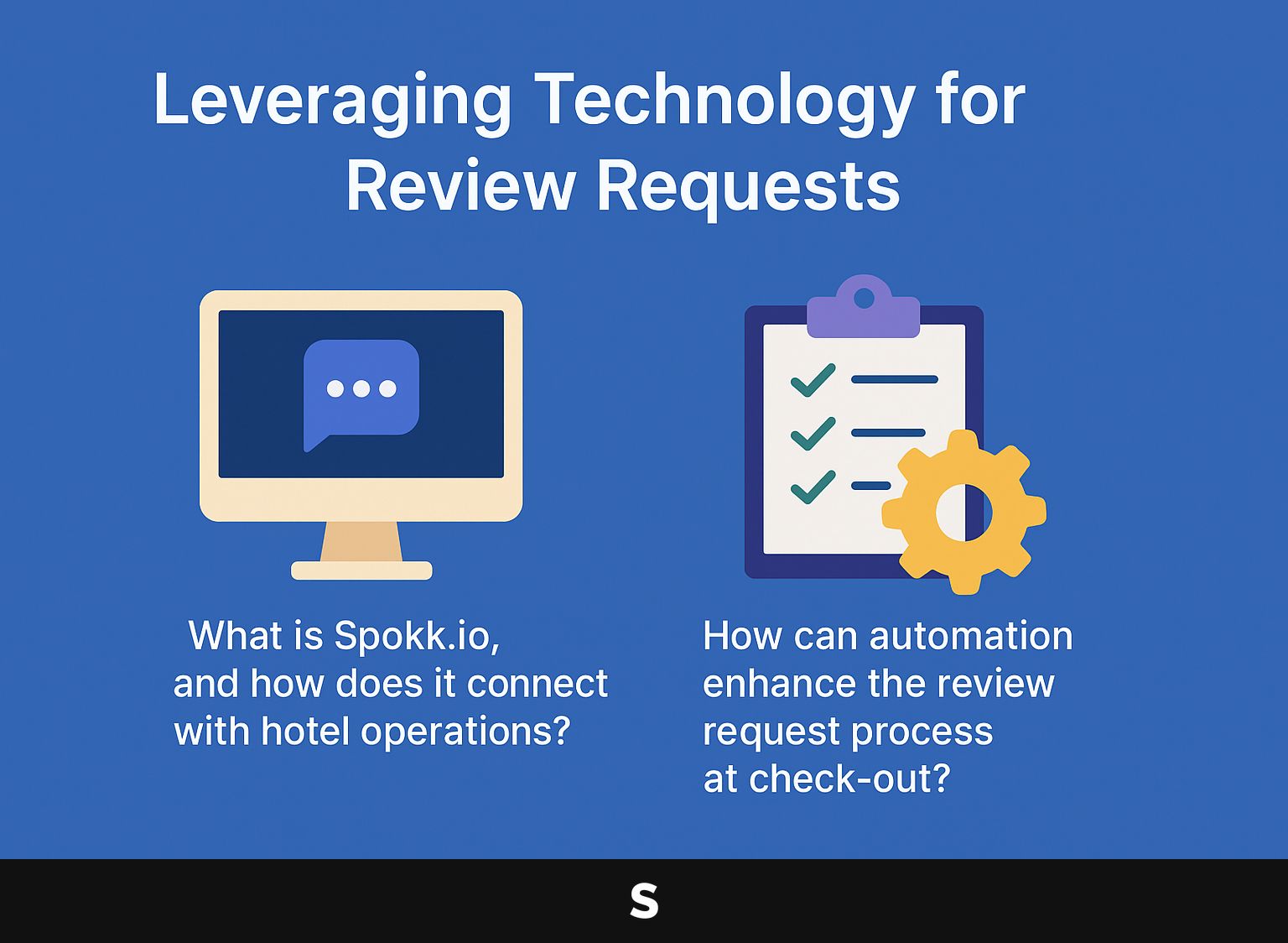
What is Spokk.io and how does it connect with hotel operations?
Spokk.io is a modern tool that easily fits into hotel processes to automatically send review requests when guests check out.
Through its intuitive dashboard, hotels can easily customize when and how review requests are sent, often directly after a guest checks out.
The platform collects guest feedback with simple text prompts and converts brief comments into complete reviews for websites like TripAdvisor.
Easy integration with popular hotel management systems, such as Opera or Lightspeed, allows for real-time data sync.
Setting up Spokk.io typically takes only a few hours, ensuring that hotels can start enhancing their online presence quickly.
How can automation improve the review request process at check-out?
Automation makes the review request process better by ensuring guests get messages promptly and consistently during check-out, leading to higher guest involvement.
Adding automatic email requests can increase your response rates by almost 30%. Services like ReviewMonkey simplify this by scheduling emails immediately after check-out.
Meanwhile, using QR codes displayed at the front desk encourages guests to leave feedback instantly; studies show that this approach increases completion rates by 50%. These methods improve guest satisfaction and provide helpful information for your business, which can make service better using data. If you’re interested in understanding more about how to manage customer feedback effectively, check out our insights on mastering customer feedback management.
Strategies to Encourage Reviews at Check-Out
Using good check-out strategies can greatly increase the number of reviews hotels get, improving their online visibility.
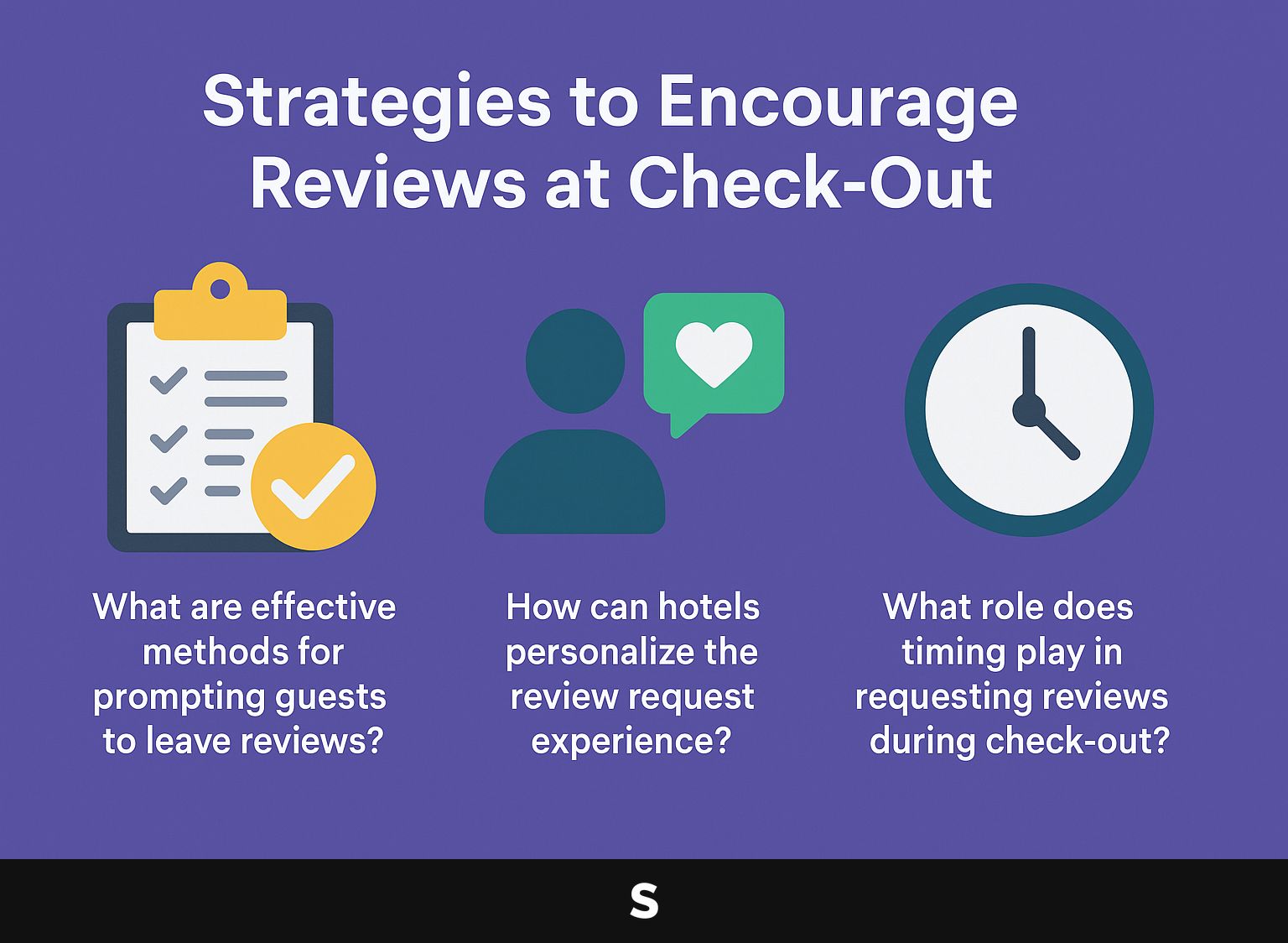
How can you encourage guests to write reviews?
Using methods like sending custom follow-up emails, placing QR codes in guest rooms, and having staff ask directly, can lead guests to write reviews.
- To make these strategies more effective, send follow-up emails according to the guest’s experience. For instance, guests who dined at your restaurant can receive a specific request to review their meal, which has shown to increase feedback by 30%.
- Placing QR codes in strategic locations, like the bathroom mirror or on room service menus, can facilitate spontaneous reviews. Research showed that properties with QR codes received 25% more review submissions than those without this technology.
- Encouraging staff to ask for reviews at checkout makes these requests feel more personal and timely.
How can hotels make the review request process more personal?
Personalizing review requests can significantly increase guest responses by making them feel valued and acknowledged.
Hotels can increase guest interaction by highlighting particular experiences they can have during their visit. For example, if a guest enjoyed a meal at the on-site restaurant, highlight this in the request:
“We hope you loved your dinner at Bella Vista!”
Acknowledging staff interactions, like a warm greeting from the front desk, can create a personal touch:
“We’d love to hear about your experience with our team, especially how Maria made your check-in smooth.”
Using tools like ReviewPro or Revinate can help produce these customized messages faster and more easily, ensuring the communication is both effective and meaningful.
What role does timing play in requesting reviews during check-out?
Asking guests for reviews right after they check out can result in more detailed and positive feedback because their experience is still fresh in their minds.
There are other optimal timings to consider. For instance, sending a request two days after check-out allows guests to reflect on their stay while the experience is still relatively recent.
You might also aim for one week later, targeting guests who might be sharing their experiences on social media. Tools like Mailchimp or Sendinblue can set up email campaigns automatically for each individual.
Both platforms are easy to set up, ensuring quick delivery without extra work, which improves your feedback and ratings.
Enhancing Guest Experience to Increase Reviews
Great guest experiences lead to more and better reviews for hotels on sites like TripAdvisor.
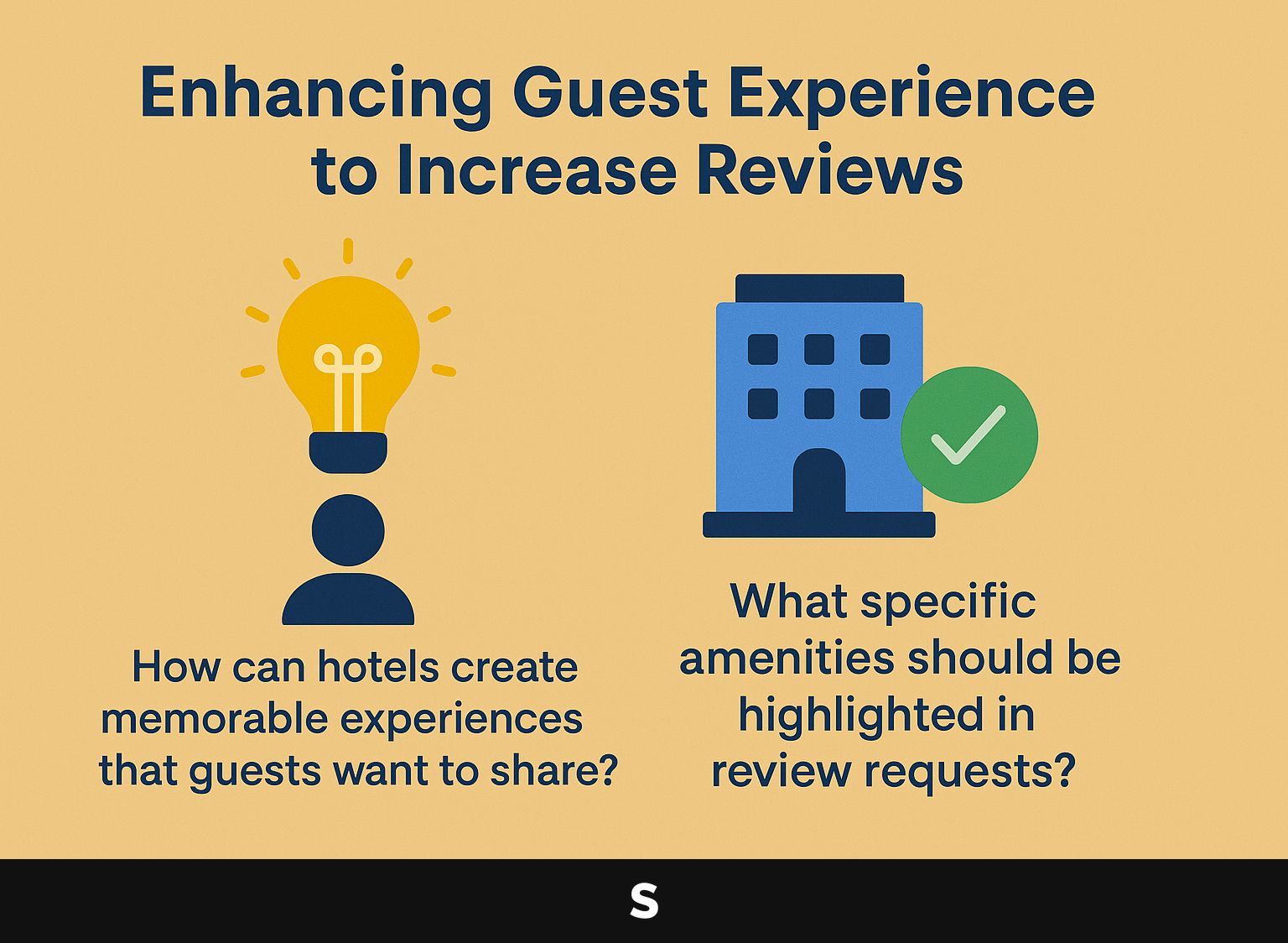
Hotels can make stays unforgettable by providing distinctive services, like custom greetings, special events, or unique amenities that guests might mention in their reviews.
- An effective method is to send personalized greetings to each visitor, including their names and preferences.
- Consider hosting themed events, like wine tasting or local artisan showcases, providing guests with unique cultural experiences.
- Offering exclusive amenities, such as luxury bath products or complimentary snacks, can also leave a lasting impression.
- Use feedback forms to gather guests’ thoughts post-stay, allowing continuous improvement of these initiatives and enhancing the likelihood of positive reviews.
See also: Mastering Customer Experience In Hospitality – Spokk for more insights on creating memorable guest experiences.
What specific amenities should be highlighted in review requests?
Highlighting specific amenities such as complimentary breakfast, spa services, or unique room features in review requests can lead to more detailed and positive reviews from guests.
For instance, specifying that your hotel offers a gourmet breakfast with locally sourced ingredients can entice reviewers to share their culinary experiences.
Mentioning a luxurious spa with exclusive treatments encourages guests to describe their rejuvenating visits.
Highlighting specific room features, like a private balcony with ocean views, can encourage guests to describe the feel of their stay in more detail.
By framing your request around these details, you create a roadmap for guests to follow, enhancing the quality and relevance of their reviews.
Training Staff to Facilitate Reviews
It’s important for employees to be well-prepared to encourage guests to write detailed reviews, as this significantly impacts both the number and quality of feedback.
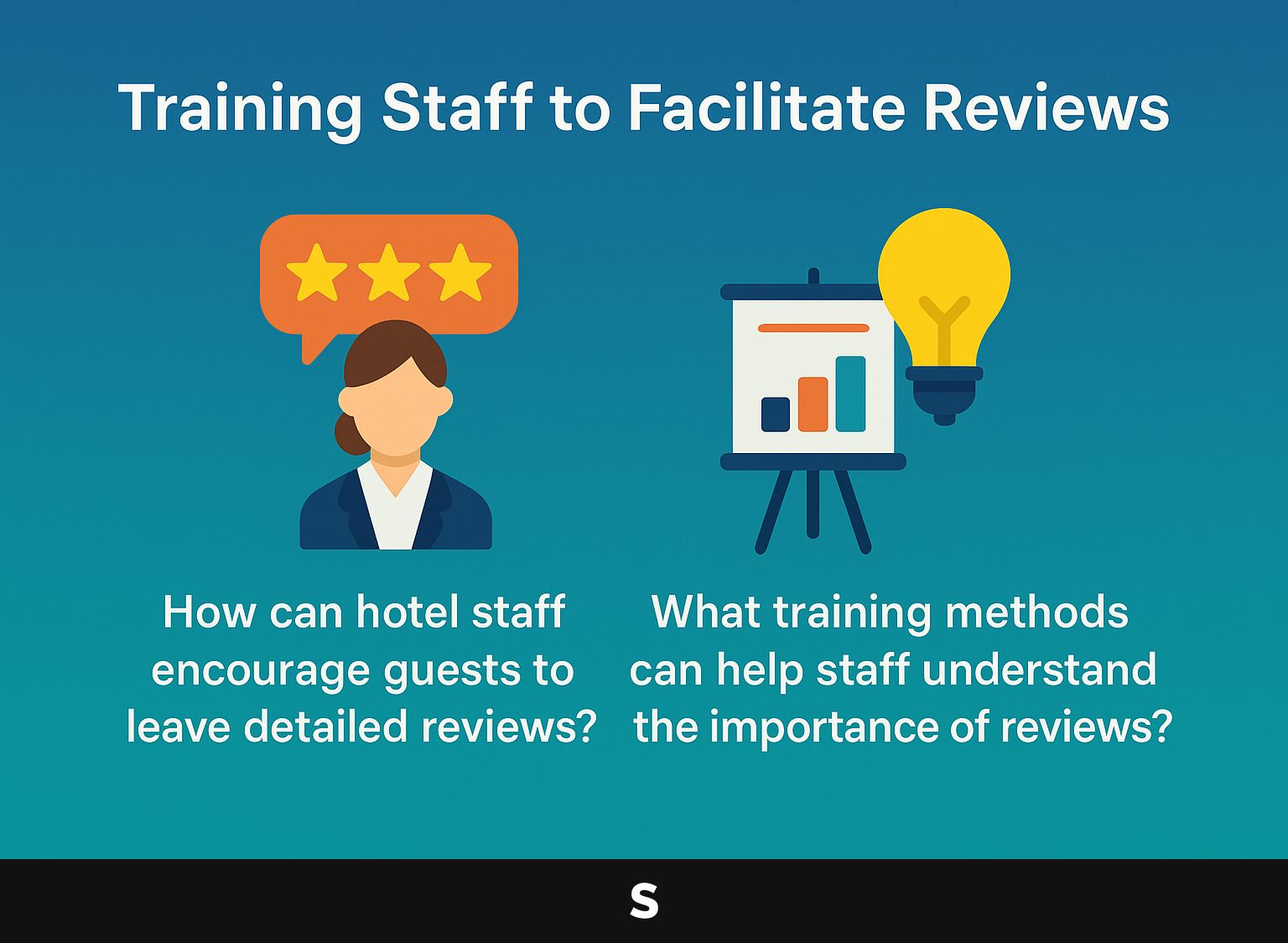
How can hotel staff encourage guests to leave detailed reviews?
Hotel staff can encourage guests to leave detailed reviews by establishing personal connections and expressing genuine interest in their experiences.
To accomplish this, staff should welcome guests by name and ask about their experience. For example, after you check in, a staff member might say, ‘How was your trip here?’ This creates a friendly atmosphere.
Following up with an email a day after their departure, inviting feedback on specific aspects like room comfort or dining, can also drive detailed responses. Using tools like SurveyMonkey for organized feedback or Google Forms for smooth collection improves this process, creating a feedback system that shows guests they are appreciated.
What training methods can help staff understand the importance of reviews?
Training methods such as workshops, role-playing scenarios, and regular feedback sessions can help staff appreciate the significance of guest reviews in the hospitality industry.
Using interactive workshops can greatly improve learning. For instance, analyzing real review samples to see what leads to positive or negative feedback helps staff relate emotionally to guest experiences.
Role-playing helps employees get used to situations they might face in reviews, like dealing with a complaint or reacting to compliments, building self-assurance.
Regular feedback meetings should concentrate on recent evaluations. This enables employees to talk about their reactions and thoughts on guest feedback, supporting a workplace culture that values responsibility and progress.
These methods show how reviews affect guest happiness and the hotel’s image.
Measuring the Impact of Review Requests
Knowing how asking guests for reviews impacts hotels helps them change their strategies and communicate better with guests.
What metrics should hotels track to assess review request effectiveness?
Hotels should track metrics such as response rates, review quality, and changes in online visibility to gauge the effectiveness of their review request strategies.
To evaluate your review request strategies, start by setting specific targets. Aim for a response rate above 20% from guests you solicit for reviews.
Analyze review quality by monitoring average ratings and sentiment in comments. Tools like Google Analytics can help track fluctuations in website traffic correlating with positive review surges.
Regularly assess your online visibility using tools such as Moz or SEMrush to observe keyword rankings, particularly in local searches. Update your methods with this information to continually improve guest interaction and your hotel’s reputation (our analysis of customer experience with artificial intelligence explores advanced strategies).
How can hotels use feedback to improve their review strategies?
Hotels can use guest feedback to identify areas for improvement in their review strategies, thereby improving the guest experience.
To analyze feedback effectively, hotels should implement regular review audits, focusing on platforms like TripAdvisor and Google Reviews.
For example, a hotel chain could use tools like Revinate to aggregate sentiments from multiple sources, identifying trends over time. Setting up a bi-monthly review of this data allows for proactive adjustments.
A case study from a successful boutique hotel demonstrated that addressing specific complaints related to cleanliness led to a 30% increase in positive reviews in just three months.
Using feedback like this can greatly increase guest satisfaction.
Addressing Common Challenges
Finding and fixing typical issues with guest reviews is important for hotels to improve their online reputation and increase feedback.
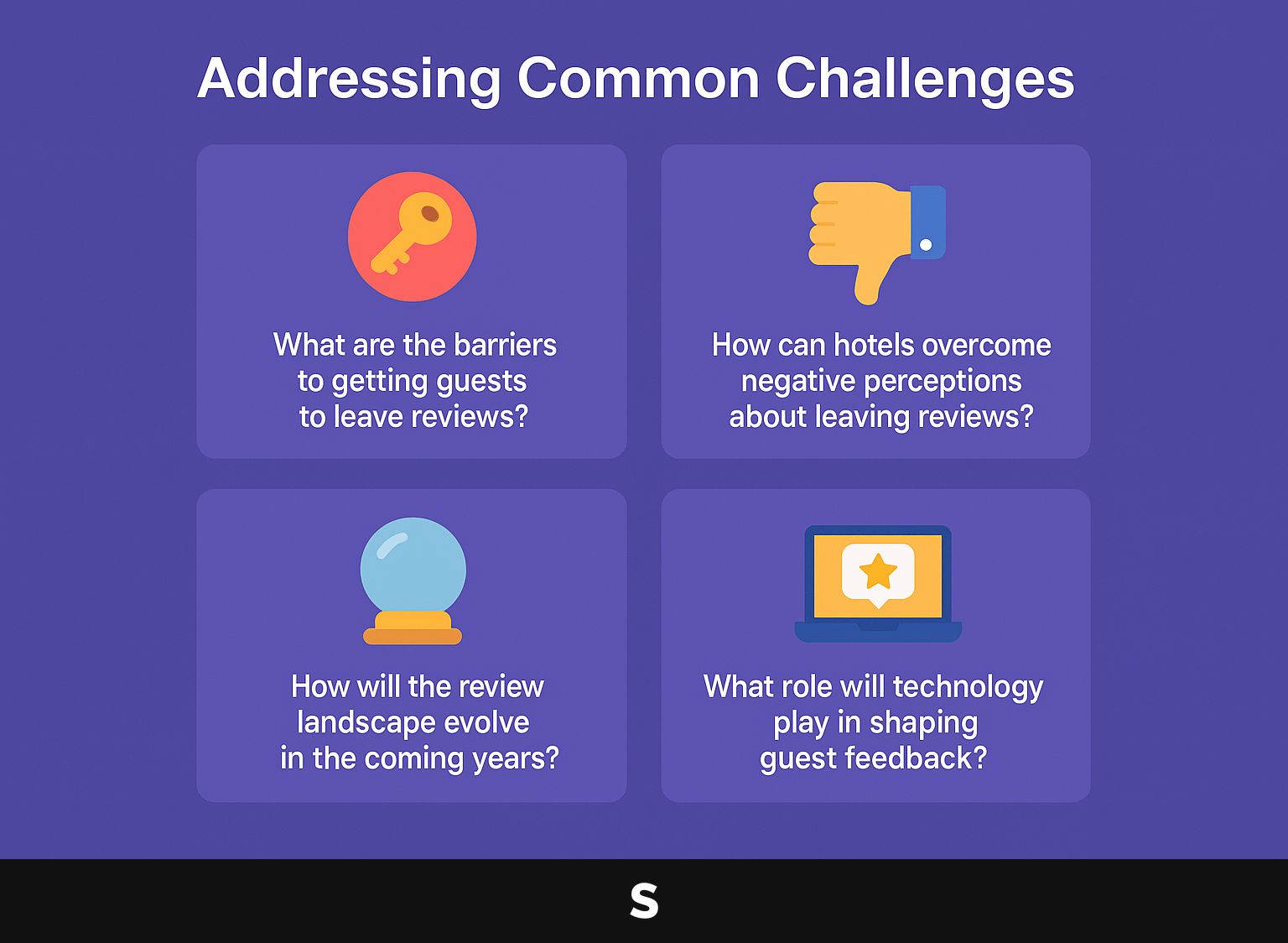
What are the barriers to getting guests to leave reviews?
Barriers such as guest reluctance due to time constraints or perceived irrelevance of reviews often prevent guests from sharing their feedback.
To overcome these challenges, consider implementing targeted follow-ups via email after checkout, reminding guests to leave a review.
Offer special deals like discounts for coming again or entries into a prize draw to increase participation a lot.
Make the review process easy by giving direct links to review sites like Google or TripAdvisor, so guests can quickly leave feedback.
Keeping the review form easy to use will lead to more responses, as guests like knowing that their time is respected and their opinions count.
How can hotels overcome negative perceptions about leaving reviews?
Hotels can overcome negative perceptions about leaving reviews by educating guests on the impact of their feedback and simplifying the review process.
For effective communication with guests, hotels should use clear and simple methods. For instance, send customized emails after a guest’s visit to explain how their feedback helps make services and guest experiences better.
Include direct links to review platforms in follow-up messages. Implement feedback kiosks in the lobby for immediate guest input, simplifying the process during check-out.
Offering discounts on their next visit encourages guests to write reviews more often. These strategies lower obstacles, allowing guests to share their experiences easily and create positive views.
What changes can we expect in how reviews are handled in the next few years?
In the next few years, reviews will probably focus more on genuine guest experiences and clear feedback.
This change may lead to more immediate methods of collecting feedback, such as in-app messages that ask guests to share their opinions right after they receive service.
Businesses can use AI tools like ReviewTrackers to examine the emotions and patterns in feedback. By focusing on real testimonials, companies will build trust and meet consumer desires for more relatable and honest stories.
As guests place more importance on honesty, explaining how their feedback is used will be key to keeping their trust.
What role will technology play in shaping guest feedback?
Technology will be important in handling guest feedback, with progress in AI and automation simplifying how hotels gather and address reviews.
Platforms such as ReviewPro and TrustYou use AI to examine guest reviews from various websites, enabling hotels to gather feedback quickly.
By connecting these tools with current property management systems, hotels can automatically analyze guest feedback to find frequent topics in their experiences.
For instance, a hotel might receive alerts about recurring mentions of noisy rooms, guiding them to take immediate action.
Using tools like Revinate can make replying to reviews easier, allowing for quick and customized responses, which improves guest satisfaction.
Frequently Asked Questions
How can hotels encourage guests to leave TripAdvisor reviews at check-out?
Hotels can connect with platforms like Spokk.io to send review requests at check-out, allowing guests to quickly and easily leave a review with specific details about their stay.
Why is it important for hotels to get more TripAdvisor reviews at check-out?
Reviews given at check-out usually have more details, offering useful information for future guests and improving the hotel’s rating on TripAdvisor.
Can guests leave TripAdvisor reviews at check-out without a lot of effort?
Yes, with tools like Spokk.io, guests can easily leave detailed TripAdvisor reviews in just 10 seconds by typing a quick message about their stay.
What should hotels do with the TripAdvisor reviews collected at check-out?
Hotels can use these reviews to analyze feedback, make improvements, and showcase positive reviews on their website and social media channels to attract more guests.
How can hotels make sure guests leave positive reviews at check-out?
By providing exceptional service and experiences during their stay, guests are more likely to leave positive reviews at check-out. Hotels can give rewards like discounts or special deals to guests who write a review.
Are there any benefits for hotels to have a high number of TripAdvisor reviews?
Many good reviews on TripAdvisor can raise the hotel’s position on the site, helping future guests locate it easily and leading to more reservations. It also helps to build trust and credibility for the hotel among travelers.

